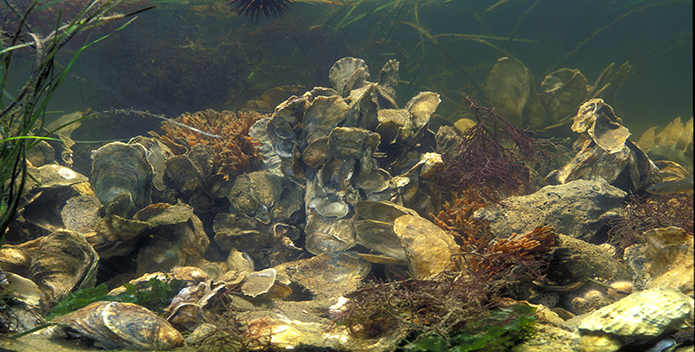The following first appeared in, The Virginian-Pilot.
As if flooding from sea-level rise isn't enough, climate change could also threaten our beloved Virginia oysters. For all of us who enjoy oysters regularly, it's no surprise that Vibrio bacteria are more likely to be an issue during warmer months.
As a recent story in The Pilot notes, there could be more restrictions placed on the oyster harvest if the water stays warm longer, potentially leading to "considerable economic costs" for the Chesapeake Bay seafood industry.
Climate change and the resulting toll on our waters should concern all of us. For the Chesapeake Bay and its many rivers and streams, climate change adds new challenges to a system already under stress from pollution. Changes in water temperature affect all life in the Bay, from underwater grasses to striped bass. Warm waters hold less oxygen, increasing dead zones that can kill fish, crabs, and oysters. That's not to mention the potential economic costs and safety issues that threaten our coastal region due to intense storms, droughts, and sea-level rise. The destruction recently wrought by hurricanes to our south should serve as a wake-up call here.
Climate change is a global issue that hits close to home. Fortunately, as individuals and a community, there are many things we can do. Driving less is a great place to start. Carpool to work whenever possible. Ride a bicycle or consider using public transportation. Plan trips to avoid extra outings to the store or soccer practice. Drivers will spend less time in stressful traffic and pump less greenhouse gases into the atmosphere.
At home, simple steps can reduce the amount of energy you use. Switch out incandescent light bulbs and old appliances for more energy-saving versions. Make sure your attic is well insulated, and that windows and doors are sealed properly. Install a programmable "smart thermostat" that turns down the air conditioning or heat when everyone is away at work or school. Solar panels on roofs produce clean, renewable energy. In addition to putting a small dent in greenhouse gas emissions, all of these practices will save money on utility bills, and there are often tax incentives available to help pay for the changes.
The threat of sea-level rise is inescapable in Hampton Roads. But there are natural solutions to tackling the issue. Preserving marshes and wetlands helps absorb floodwaters, filter polluted runoff, and trap carbon. At home, many people can help address the problem by planting trees, and installing rain gardens and living shorelines. These approaches reduce carbon emissions entering the atmosphere, mitigate recurrent flooding and filter polluted runoff.
On a larger scale, Virginia is steadily reducing pollution under the Chesapeake Clean Water Blueprint, the federal-state partnership to restore the Bay and its rivers. Many practices the commonwealth is implementing under this plan also reduce greenhouse gas emissions and increase coastal resiliency. That includes installing forested buffers along waterways and constructing wetlands. Hampton Roads residents should tell their elected representatives that support for the blueprint is vital for our future.
For more ideas, people can visit the Chesapeake Bay Foundation's Brock Environmental Center on the Lynnhaven River.
From solar panels to rain gardens, it's all in action at one of the most sustainable buildings in the world. Built with efficiency in mind, the center uses 80 percent less energy than a typical building of its size. Its solar panels and residential wind turbines produce far more energy than the building uses.
The center is open to the public for free tours, where anyone can take away at least one small thing they can do at home.
Climate change poses a real danger to Virginia. But we can all take action. By doing so, we will help our communities, the people, and businesses that depend on healthy waterways and our oysters.
Harry Lester, CBF chairman of the Board of Trustees
Issues in this Post
Climate Change Chesapeake Clean Water Blueprint Climate Change Eastern Oysters CBF in Virginia



